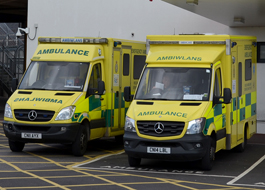Almost 70% of people with life-threatening illnesses and injuries received an emergency response within eight minutes during the first month of a year-long pilot to test changes to the Welsh Ambulance Service, new figures published today show.
A third of people (34.7%) received a response within just four minutes, the figures show.
The figures for October – the first month of the new clinical response model – show the Welsh Ambulance Service has met and exceeded the target that 65% of responses to the most life-threatening emergencies should arrive within eight minutes.
A total of 68.7% red calls were responded to within eight minutes. The average response time to this type of call was five minutes and 44 seconds.
The figures show:
- The Welsh Ambulance service received 38,155 emergency calls in October 2015, an average of 1,231 a day;
- Of these, 1,877 (5%) were immediately life-threatening – red – emergency calls. 68.7% (1,267) responses arrived within eight minutes, above the target of 65%;
- 74% of red calls were responded to in nine minutes; 78.9% within 10 minutes.
Deputy Health Minister Vaughan Gething said:
“The figures published today show the new system is working, with nearly 70% of the most immediately life-threatening calls to the Welsh Ambulance Service receiving a response within eight minutes.
“I want to pay tribute to the ambulance service’s hard-working frontline clinicians, volunteer first responders and clinical contact centre staff for their dedication and commitment. Their work embracing the new clinical response model is crucial to delivering better outcomes for patients.
“We know that change can be difficult in the health service – for staff and the public. However, the initial figures from this pilot suggest that the new clinical response model is ensuring that patients are getting the right care, in the right place, at the right time.
“I expect the service to build on these early results; learn lessons and continue to improve to ensure people who need the life-saving skills of ambulance clinicians do so in the quickest time possible and get the best possible outcomes.”
Tracey Myhill, chief executive of the Welsh Ambulance Service said:
“We’ve made a really solid start on this ground-breaking new pilot, and today’s figures are testament of that.
“We owe thanks not just to the new model – which means patients are now receiving the right care, at the right time, by the right clinician – but to the staff who have been working harder than ever to deliver timely and high quality care.
“We’re grateful to staff for embracing this new way of working, and to the people of Wales for their patience and understanding while we continue to improve.
“We’re committed to building on these early results and providing an ambulance service that our patients can be proud of.”
Help keep news FREE for our readers
Supporting your local community newspaper/online news outlet is crucial now more than ever. If you believe in independent journalism, then consider making a valuable contribution by making a one-time or monthly donation. We operate in rural areas where providing unbiased news can be challenging. Read More About Supporting The West Wales Chronicle

























